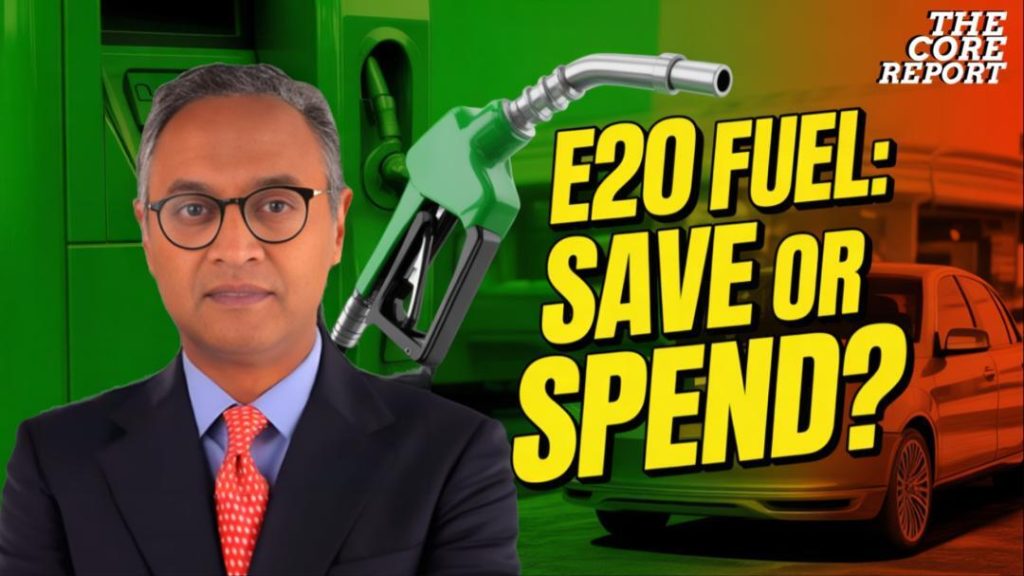
E20 Fuel in India: Benefits, Risks & What Vehicle Owners Must Know
India’s shift towards E20, a petrol blend containing 20% ethanol, is a significant step towards reducing carbon emissions, boosting energy security, and supporting farmers. The government has been promoting the use of E20, which is expected to make a significant impact on the country’s environment and economy. However, as the deadline for making all new vehicles E20-compliant approaches, vehicle owners must be aware of the benefits, risks, and requirements of using this new fuel blend.
Benefits of E20 Fuel
Studies conducted by the government have shown that E20 fuel offers several benefits over regular petrol. One of the most significant advantages is its potential to reduce carbon emissions. Ethanol, a biofuel, is a cleaner-burning fuel that produces fewer greenhouse gases compared to traditional petrol. This means that using E20 fuel can help reduce the country’s carbon footprint and contribute to a cleaner environment.
Another benefit of E20 fuel is its potential to boost energy security. India is one of the largest importers of crude oil, and the use of ethanol, which is largely produced domestically, can reduce the country’s dependence on foreign oil. This can also help reduce the impact of fluctuations in global crude oil prices on the Indian economy.
Additionally, the production of ethanol from sugarcane and other biomass sources provides a new income stream for farmers, promoting rural development and poverty reduction. The government has also set a target of producing 10% of the country’s fuel requirements from ethanol by 2025, which can create new job opportunities and stimulate local economies.
Risks of E20 Fuel
While E20 fuel offers several benefits, there are also some risks that vehicle owners must be aware of. One of the main concerns is that older vehicles may not be designed to run on E20 fuel, which can cause engine wear, fuel system corrosion, and mileage loss. This is because older vehicles may not have the necessary sensors and fuel injectors to handle the different composition of E20 fuel.
Another risk is that the use of E20 fuel may not be compatible with all vehicle types. Some vehicles, especially those with high-performance engines, may not be able to handle the reduced power output of E20 fuel. This can affect the vehicle’s performance, including acceleration and fuel efficiency.
What Vehicle Owners Must Know
As the deadline for making all new vehicles E20-compliant approaches, vehicle owners must be aware of the following:
- Check your vehicle’s compatibility: Before using E20 fuel, vehicle owners must check whether their vehicle is compatible with the new fuel blend. This can be done by checking the vehicle’s manual or consulting with a mechanic.
- Use the right fuel: Vehicle owners must ensure that they use the right type of fuel for their vehicle. Using the wrong fuel can cause engine damage and reduce fuel efficiency.
- Monitor your vehicle’s performance: Vehicle owners must monitor their vehicle’s performance after switching to E20 fuel. This includes checking for any changes in engine performance, fuel efficiency, and mileage.
- Get your vehicle serviced regularly: Regular servicing is essential to ensure that your vehicle is running smoothly and efficiently on E20 fuel. Vehicle owners must get their vehicle serviced regularly to prevent any engine wear and tear.
Government Initiatives
The Indian government has taken several initiatives to promote the use of E20 fuel. One of the main initiatives is the introduction of a new fuel policy that requires all new vehicles to be E20-compliant by 2025. This will help reduce the number of vehicles that are not designed to run on E20 fuel and promote the adoption of cleaner fuels.
The government has also set up a network of E20 fuel stations across the country to make it easier for vehicle owners to access the new fuel blend. Additionally, the government has provided incentives to vehicle manufacturers to produce E20-compliant vehicles and to farmers to produce ethanol.
Conclusion
The introduction of E20 fuel in India is a significant step towards reducing carbon emissions, boosting energy security, and supporting farmers. While there are some risks associated with using E20 fuel, vehicle owners can take steps to minimize these risks by checking their vehicle’s compatibility, using the right fuel, monitoring their vehicle’s performance, and getting their vehicle serviced regularly.
As the deadline for making all new vehicles E20-compliant approaches, vehicle owners must be aware of the benefits, risks, and requirements of using this new fuel blend. By taking the necessary precautions, vehicle owners can enjoy the benefits of E20 fuel while also contributing to a cleaner and more sustainable environment.
News Source:






